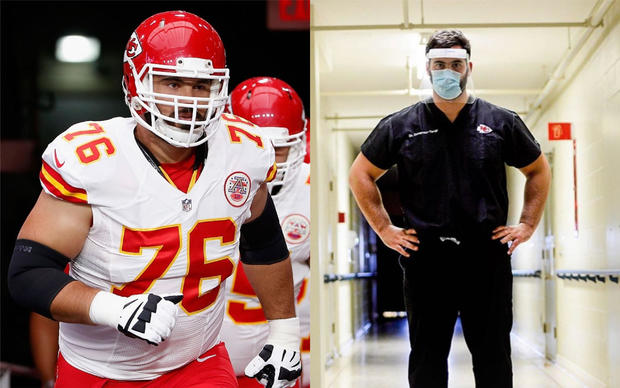It was a little over two months ago that people crowded into bars and homes to watch the Super Bowl together, not even thinking about staying six feet apart. A lot has changed in this short amount of time — sports fans can no longer watch live games together, and one Super Bowl champ is no longer just a football player, he’s a doctor on the front lines of the coronavirus fight.
Life was a whirlwind for Kansas City Chiefs player Laurent Duvernay-Tardif after his team beat the San Francisco 49ers in the Super Bowl. But life was soon going to become drastically different for the NFL player, who also happens to hold a doctorate in medicine, he says in this month’s digital issue of Sports Illustrated.
Following the victory, Duvernay-Tardif participated in the Super Bowl parade in Kansas City, then went on vacation. When he arrived back home to Canada, life was drastically different for everyone. Self-isolation guidelines were now in place to help prevent the spread of COVID-19.
“It was an adjustment,” he recalls in the article. “You start asking: Are we going to cancel our charity golf tournament in June? Our big auction in April? Plus, the border is closed. It’s not like I could get back to Kansas City, with my teammates, when we were supposed to begin training for next season.”
Duvernay-Tardif says he started to think about people who were going through tougher times — including the physicians he knew from medical school. “I have friends who are working in emergency rooms. One does triage and tests patients for COVID-19. Those people are on the front line, and they’re giving everything to protect us,” he writes.
Soon, the 29-year-old was starting to ask how he could help. Since he didn’t yet have a license to practice medicine, he was using his platform to relay messages from health officials to his followers. Still, he wanted to do more.
“A few days ago, health ministry officials started a campaign to recruit health care professionals, especially students in medicine and nursing,” Duvernay-Tardif writes. “It’s now possible for me to go back and help. I had already wanted to, but when it’s real, it hits you, the gravity involved.”
After discussing it with his girlfriend, who could be at risk of exposure to the virus if he began working with patients, Duvernay-Tardif decided to officially join the fight. He said his team has been “amazing” and was “proud” of his decision.
He first had a “crash course” to review the basics of how to protect himself and others. Then, on April 24, he began his first day at a long-term care facility near his hometown, about an hour outside of Montreal. “I felt nervous the night before, but a good nervous, like before a game, and I packed everything neatly: scrubs, white coat, extra pens, even a second pair of shoes that I could leave in my locker, knowing they were clean,” Duvernay-Tardif writes.
The NFL player said he’s in more of a nursing role, helping to relieve other workers. “It’s wild to think that just 10 weeks earlier I played in the biggest game in sports,” he writes, saying some people at the facility did recognize him a football player.
“Playing in the Super Bowl vs. heading back to the medical system during a pandemic is totally different. Back in February, I knew that 100 million-plus people were going to be watching, and I wanted to win,” Duvernay-Tardif says in the magazine. “When you’re going in to help it’s more about your duty as a doctor and a citizen. It’s not the time to be the hero and be impulsive. You’ve gotta do it the right way. You’ve gotta really take this seriously when it comes to washing your hands, not touching anything.”
In addition to working in the long-term care facility, he’s putting his unique skillset to use as part of the NFL Players Association task force, helping to determine different scenarios for the safest return to an NFL season.
“It’s too soon to say when sports might come back. Or what that might look like. What I can say is if we’re not playing in September, knowing all the implications of what sport means for a nation and the money behind this huge industry, there are going to be bigger issues than not playing football,” he writes.


